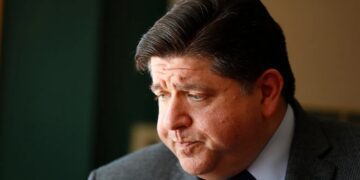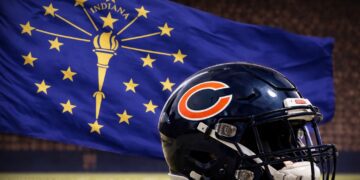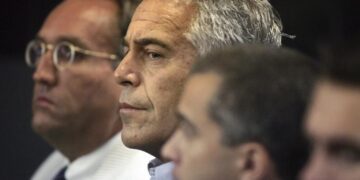
By Nancy Thorner –
From both sides of the political aisle, all Americans should be alarmed by the bill that recently passed the U.S. House of Representatives.
Now Democrats are renewing their push to ram Bill H.R.1 – For the People Act of 2021 — through the Senate.
If H.R. 1 becomes law, which is not really for the American people at all, America will never be the same and the game will be permanently rigged in favor of the Democrats. H.R. 1 would put Democrats in charge of our elections and would give liberals permanent and TOTAL power.
On Sunday, May 30, Dr. Jay Lehr and Tom Harris were joined by their guest Joseph A. Morris in this week’s episode of The Other Side of the Story to learn what is really going on with H.R. 1. The program's title: H.R.1 – A Betrayal of American Democracy. Check here for the podcast of the event on America Out Loud Talk Radio.
Besides his role at Heartland, Mr. Morris practices law in Chicago, including election law, and has served for many years as a hearing officer for the Chicago Board of Elections. He presided over hearings held to determine the eligibility of both Chicago’s former mayor, Rahm Emanuel, and its current mayor, Lori Lightfoot, to be on the ballot. Mr. Morris is a former Assistant Attorney General of the United States under President Ronald Reagan.
Dr. Jay Lehr is a Senior Policy Analyst with the International Climate Science Coalition and former Science Director of The Heartland Institute. He is an internationally renowned scientist, author, and speaker who has testified before Congress on dozens of occasions on environmental issues and consulted with nearly every agency of the national government and many foreign countries. After graduating from Princeton University at the age of 20 with a degree in Geological Engineering, he received the nation’s first Ph.D. in Groundwater Hydrology from the University of Arizona. He later became executive director of the National Association of Groundwater Scientists and Engineers.
Tom Harris is Executive Director of the Ottawa, Canada-based
International Climate Science Coalition and the new not for profit International Climate Science Coalition – Canada. He is also a policy advisor to
The Heartland Institute. He has 42 years experience as a mechanical/aerospace engineer, science and technology communications professional, and S&T advisor to a former Opposition Senior Environment Critic in Canada’s Parliament.
In so far that Joseph A. Morris, with his many years of experience in the practice of election law, had a wealth of information to share as the special guest of Jay Lehr and Tom Harris on their America Out Loud Talk Radio program, the only solution for Thorner was to present her article in two parts.
Part One
Following, Morris expounds upon three topics of great concern that threaten the very fabric of American democracy.
Question 1: Questionable elections?
Jay Lehr entertained the first question to Joe Morris: "Having read about 6 states with very questionable elections, how did that get dismissed without an investigation and why did the Supreme Court ignore it?
Morris: "The short answer is that people who tried to bring those cases did a terrible job at bringing the cases despite having months and months prior to the election, and then weeks and weeks after the election, to get their ducks in order to find and prepare the evidence and marshal the arguments, etc. When the rubber met the road, they were much better at press conferences than they were at prosecuting lawsuits. They marshaled the evidence; they didn't marshal the facts. It is terrible when you go into court all puffed up and you make extensive claims and don't have the evidence to back them up. You start losing credibility very rapidly and the cases deflate very quickly."
“Looking back on it, of course there was election fraud and mistakes made in the 2020 election. It was not perfect. Elections never are.”
“I don't think the promise of democracy is that people get perfect elections, you get fair elections. Out experience is that everywhere across the country from time to time cheating happens. There are all kinds of cheating. Every time someone finds a new rule or technology which gives that side an advantage, the other side will catch up. Both sides are pretty good at cheating. Both sides are pretty good at changing the rules of the game to take advantage of the situation. It happens in state after state across our country.”
"One of the great virtues, according to Morris, is the Electoral College system. If a problem is found in one state, it stays in that state and at most will affect the Electoral votes in that state. If we had a count every vote universal voting system in our country, that whoever wins the popular vote (the majority vote) would be president rather than the Electoral College vote, we would have to count every single precinct, every district, and every singe state across the country every time there is a question.''
“This way we know that the problem may be limited to this state or that state and we can then define the necessary analysis to that place.”
"One of the defects of HR1 pending in Congress right now is an attempt to nationalize the conduct of elections. For nearly 250 years elections have successfully been conducted leaving the conduct of elections to the states." End of quote.
Question 2: About getting rid of Electoral College?
Morris: "Trying to get rid of the Electoral College is not in HR1, but it is no secret that the Left would like to get rid of the Electoral College."
"Important constituents in this country, mostly in the Democrat Party, favor the abolition of the Electoral College and going straight to a majority vote for president. I think it's a huge mistake in relation to the mechanics of conducting elections and what it does to the nature of our federal system."
"It requires politicians to go everywhere in the country, not just to high population states. A handful of states in any given year might be described as swing states, but as time passes the identity of swing states rotate across the country depending on the political make up of the populous. Those who want to abolish the Electoral College can't point to any democracy of our size anywhere in the world that does it better."
"One of the things we risk is destroying the two party system. We don't want to have a "pure" democracy in America, meaning a strict system of majority rule. For instance, we don't want the majority to say that we must have such and such a religion. The last thing we must not do to preserve a "free" and "democratic" republic is to go down the path of starting to weaken the Constitution of the U.S., our greatest bulwark against tyranny that the world has ever seen." End of quote.
Question 3: How can it be illegal for states to require photo ID's?
"Morris: Our democracy is based on three key principles:
(1) "One Person / One Vote." That means that everyone who has a right to vote should be free to do so and have the voted counted; that no one's vote should be counted more than once; and that no one who does not have the right to vote should cast a vote that is counted.
(2) Only citizens get to vote. We are a self-governing people; we don't allow rulers and citizens of other nations to govern us.
3) Secrecy of the ballot: For whom you cast your ballot is between God and you and no one has the right to look over your shoulder.
Conducting elections in accordance with these principles requires that each individual voter be identified.
In olden days when one voted in one's own precinct on Election Day at polling stations staffed by one's neighbors, identification was easy. Either everybody knew you or, if you (or they) were newcomers, you'd prove your identity by comparing your current signature (given on your application for ballot) with your signature on your voter registration form. (Voter registration forms were kept in binders by precinct, and physically shipped to the precinct on Election Day.) There was a lot to be said for the integrity and simplicity of that system.
Today, if we are going to make it ever more convenient for convenience-demanding Americans to vote, by offering early voting, voting in any number of far-flung voting centers, voting by mail, etc., it becomes all the more important to identify who is casting a ballot and connecting an (unopened and unseen) ballot with the identity of the person casting it.
There are many reasonable ways of doing this, and States should be encouraged to experiment with them (and not condemned as "racist" for it) to see which ones work best.
Reasonable ways of identifying voters and their ballots include many simple systems supported by documents that are easily obtained, inexpensive, and familiar to all, including government-issued identifications (such as passports and drivers' licenses), social security numbers (or the last-four-digit routine), voter registration signatures, and voter-registration unique identifier numbers issued by electoral boards (typically when preparing vote-by-mail materials, to connect ballots to voters by putting the ID number on the return envelope).
Unreasonable ways of identifying voters would be anything that doesn't involve such simple, inexpensive, and universally understood means of identifying oneself, and would be onerous and extreme, such as requiring DNA tests, or insisting that one be accompanied to the polls (at any age) by both of one's parents and by three people who will sign identification affidavits; or anything that is demanded only of some people (especially if they're targeted by race, sex, or political party) and not of everyone.
Thus, requiring voter ID cannot be illegal because identifying voters is essential for democracy. The universe of reasonable ways in which to accomplish voter-identification is very broad, and States should be encouraged to experiment to find the best and least expensive ways, and not be condemned for their efforts.” End of quote.
It is well to remember, that we are the only developed nation that does not universally require photo ID to vote.
Part two will cover some of the problems of HR 1 as explored by Robert A. Morris in his interactions with scientists Jay Lehr and Tom Harris.
Related







